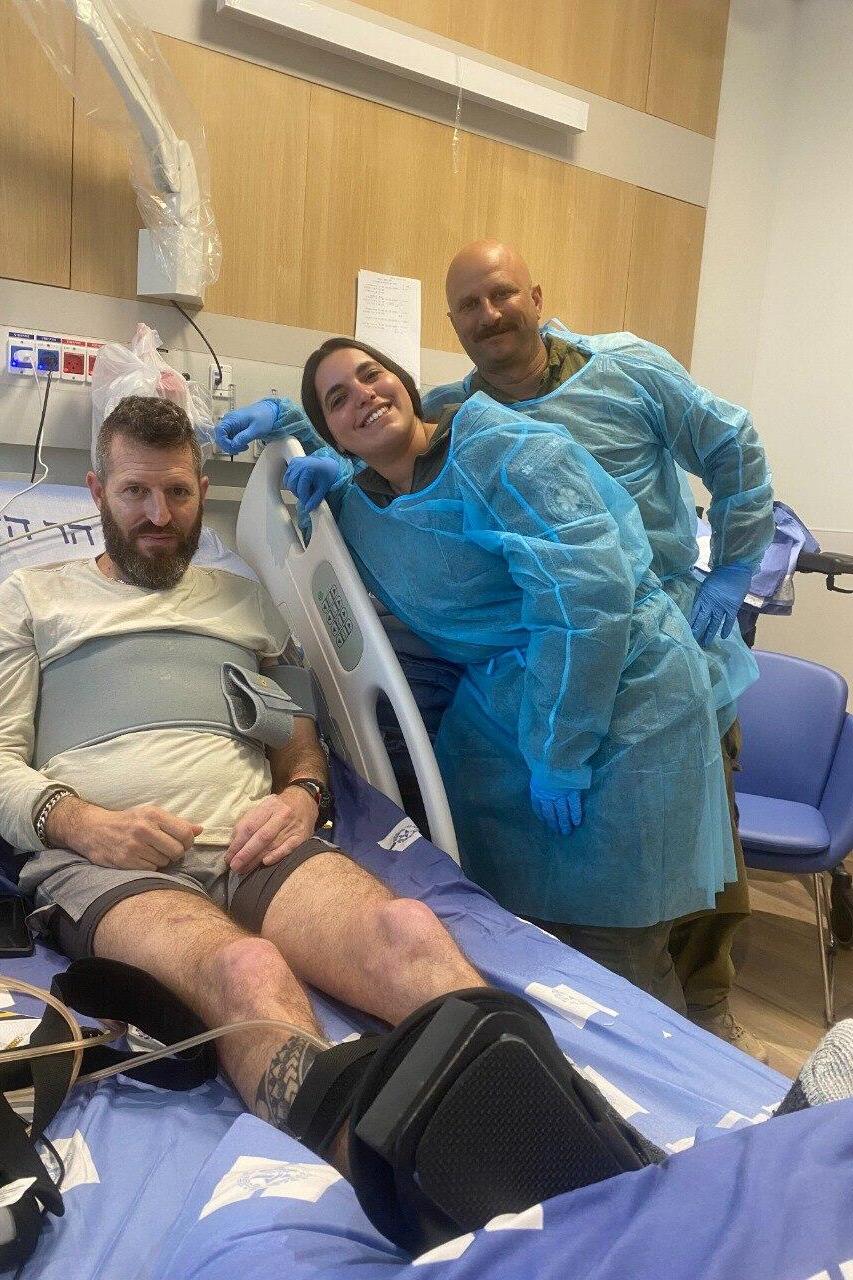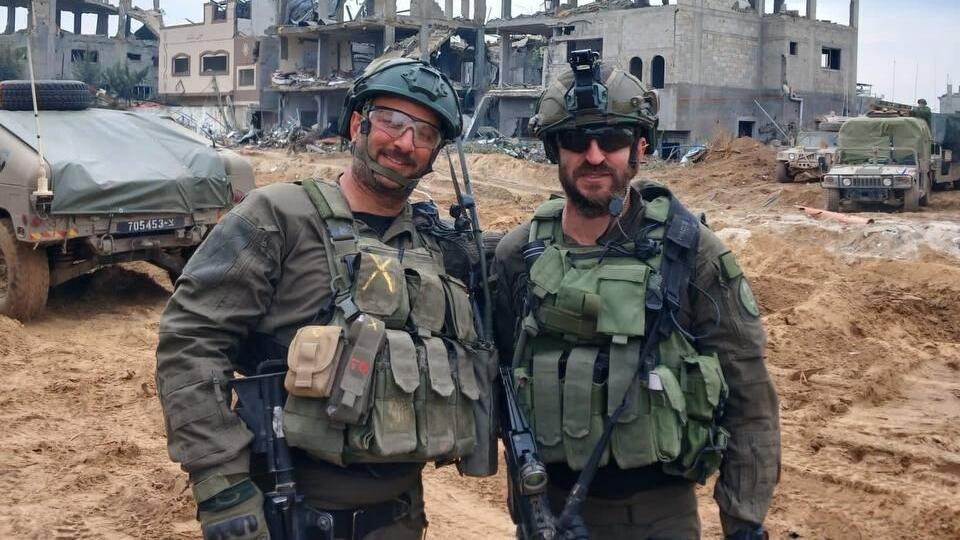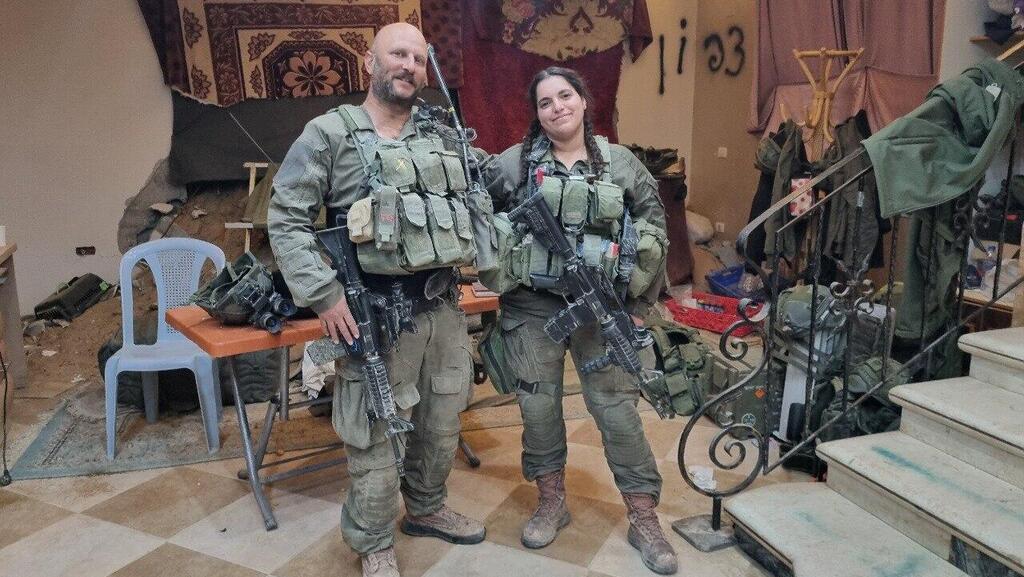Getting your Trinity Audio player ready...
Lt. Col. (Res.) Yonatan (Yonty) Bahat is struggling to reach for his phone placed on the table next to his hospital bed. Every movement sends waves of pain through his body. He shows me a photo of an IDF soldier injured in the field, his severed leg oozing blood. At first, it's hard to believe the photo is that of a training dummy and not a real soldier.
More stories:
Yonty, deputy commander of the 646th Reserve Battalion, runs a company that trains military units and emergency organizations in dealing with emergency events.
3 View gallery


Lt. Col. (Res.) Yonty Bahat with paramedic Litav and his brother Lt. Col. (Res.) Nadav
(Photo: Dr. Anat Bahat-Dinur)
The picture was taken before the war in Gaza, when he traveled to the U.S. to train with the U.S. Air Force's emergency medical service. The scenario was entirely hypothetical: a sudden terrorist attack on a military base in the Middle East. Who would've thought it would come true, and on such a scale?
A few months later, on January 8, Yonty found himself on the other side of the drill: critically wounded with a chest wound in southern Gaza after being hit by six bullets, one of which pierced his lung.
Still conscious, he remembered what his instructors taught him during training. "I told my combat medics that I needed a senior medic to perform a chest tube operation on me because I was spitting blood and was having trouble breathing. The unit commander, Itamar, was also injured in the encounter, and my soldiers gave us initial treatment until the medical team arrived," Yonty explained.
Leading the medical team was Litav, a paramedic in Yonty's unit. Litav, 26, had known Yonty since her service as an instructor at the IDF's military medical school. "Yonty's company, Extreme Simulations, held medical simulations during one of our training sessions, and from that moment on I recommended them to every medical unit that arrived for training. As an instructor, I also received important tips from them, and when Yonty was injured, I implemented them in the field," she told Ynet.
3 View gallery


Lt. Col. (Res.) Yonty and his brother Lt. Col. (Res.) Nadav in Gaza
(Photo: Amnon Bahat)
As the senior medic, Litav understood that Yonty needed to get to the hospital as quickly as possible, so she decided to land the helicopter to evacuate the injured within Gaza's territory. She performed an emergency surgery on him in the field even before he was handed over to medical professionals. "I performed a chest tube operation on him with a needle after cutting the skin tissue."
"I remember her saying, 'I won't anesthetize you. Be strong.' And then she started cutting," Yonty recalls.
"It was important to me that he remained conscious. I told him, 'You'll get through this, you're a hero.' He was the best patient I ever had because he fought alongside me for his life," according to Litav.
Also present was Yonty's younger brother, Lt. Col. (Res.) Nadav, an officer in the evacuation unit who transported the wounded to the helicopter. "I recognized him by his foot sticking out of the vehicle. Even after 46 years, you recognize your brother's foot," Nadav recounted when I met him and Litav on the outskirts of Khan Younis, two days before they left Gaza after almost four months of fighting.
"When we arrived at the landing zone, I told the soldier with me that 'I have a conflict of interest with him, you go take him to the helicopter.' I told myself that if he didn't make it out of this, I didn't want the last image I had of him to be his body bleeding on a stretcher."
Yonty was airlifted to the Barzilai Medical Center in Ashkelon and underwent complex surgery there. "My wife, Anat, who's a senior physician, was in the operating room," he says.
After a week, he was transferred to Hadassah Medical Center in Jerusalem, sedated and intubated. He spent two weeks at the hospital's rehabilitation wing.
"Yonatan arrived at the hospital in critical condition, was diagnosed with shattered bones in his shoulder and left arm, and with a penetrating chest injury and pulmonary bleeding," recounts Dr. Shir Shabbat, a rehabilitation and physiology specialist at Hadassah Medical Center. "Now, in rehabilitation, he's gradually starting to walk on his own, and will later undergo shoulder replacement surgery."
Yonty, 48, a resident of Nes Harim, is a father of two children. The younger, five-month-old Rotem, was born just before the war. Paintings of five-year-old Nadav hang on the hospital's walls.
Last week, Yonty met Litav for the first time since his injury. "I didn't know if he'd be angry with me or happy that I came," she said. "After all, I cut into him without anesthesia. It's not a pleasant experience." Soon, however, emotions welled. "His wife told me, 'Thank you for bringing back the father of my children.' What could be more moving than that?"



